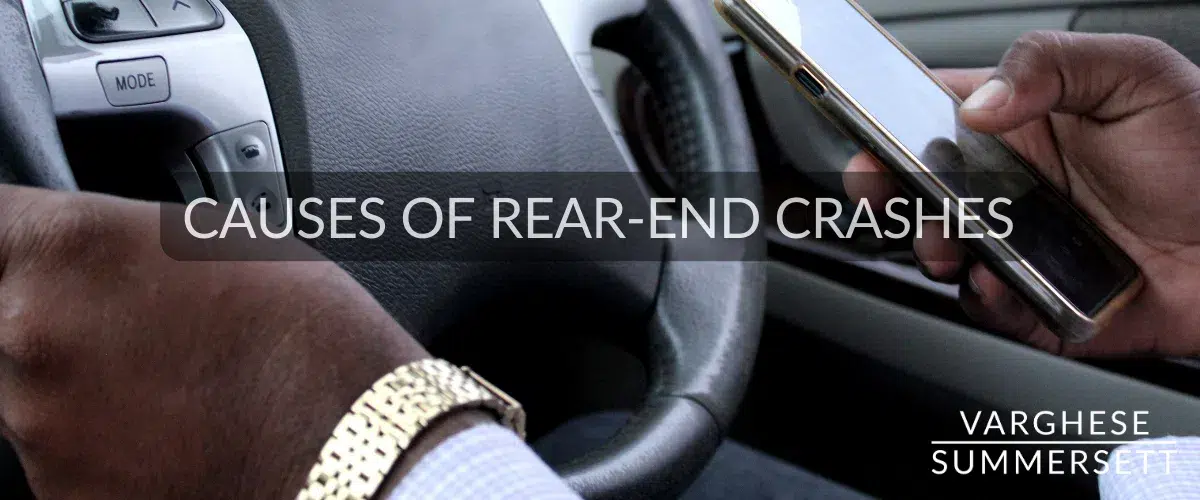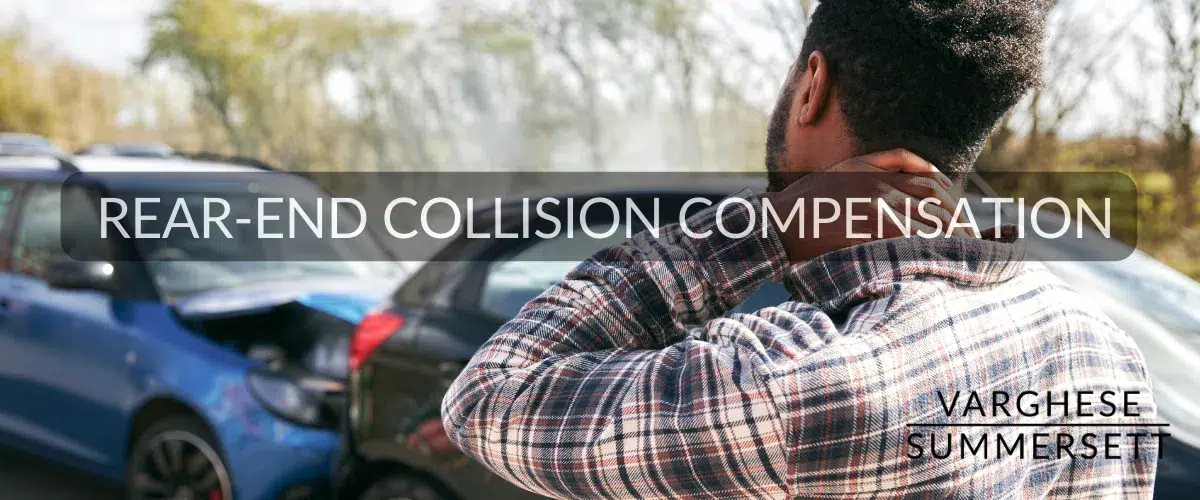Fort Worth Rear-End Collision Lawyer
The most common type of car wreck is a rear-end collision. There are about 1.7 million rear-end collisions a year in the U.S., accounting for about 1,700 deaths and 500,000 injuries.
Those staggering statistics by the Washington Post illustrate the immense impact that rear-end crashes have in this country, as well as the Lone Star state. These numbers represent not just the physical and psychological pain endured by victims, but also the tremendous financial and emotional burden placed on victims and their loved ones. A rear-end crash can drastically change the course of your life.
If you or a loved one has been injured in a rear-end collision in North Texas, it’s important to contact a Fort Worth rear-end collision lawyer as soon as possible. You may be entitled to substantial compensation for medical bills, lost wages, pain and suffering, and more. We can help.
The team at Varghese Summmersett Injury Law Group has devoted their lives to helping people who have been injured through no fault of their own. We understand how difficult life can be after an accident, and we are here to provide the legal guidance you need.
Our Fort Worth rear-end collision lawyers will work tirelessly on your behalf so that you can focus on healing and getting your life back on track. We have extensive experience in rear-end collision cases and will fight for the compensation you deserve. You don’t have to go through this alone – let us help make sure justice is served.

Common Causes of Rear-End Collisions in Fort Worth
Rear-end crashes occur when one vehicle crashes into the back of another vehicle, often due to the driver not maintaining a safe distance, speeding, or being distracted. The most common causes of rear-end collisions in Fort Worth and Texas are the same nationwide. They include:
Distracted driving
Drivers who are texting, talking on the phone, eating, or engaging in other activities that take their attention away from the road are more likely to cause rear-end collisions.
Tailgating
Following too closely behind another vehicle reduces the time and distance available for a driver to react and avoid a collision, particularly when traffic conditions change suddenly.
Sudden stops
If a driver brakes suddenly, the vehicle behind may not have enough time to react and avoid a collision. This can be caused by road hazards, traffic congestion, or the lead vehicle’s driver reacting to a situation ahead.
Poor weather conditions
Rain, fog, ice, and snow can reduce visibility and increase stopping distances, making rear-end collisions more likely.
Impaired driving
Drivers under the influence of alcohol or drugs have reduced reaction times and impaired judgment, which can increase the likelihood of a rear-end collision.
Speeding
Driving at excessive speeds reduces the time available for a driver to react to changing traffic conditions, increasing the risk of rear-end collisions.
Mechanical issues
Brake failures, worn-out tires, or other mechanical problems can cause a driver to be unable to stop in time, leading to a rear-end collision.
Inattentiveness or fatigue
Drivers who are not paying full attention to the road or are drowsy may not be able to react quickly enough to avoid a rear-end collision.
Common Injuries from Rear-end Collisions in Texas
Rear-end collisions can cause various injuries, ranging from mild to severe, depending on the speed of the vehicles, the types of vehicles involved, and if the airbag deployed. The injuries may include whiplash, concussions, fractures, spinal cord injuries, and even traumatic brain injuries. The physical, psychological, and financial repercussions can be substantial and can alter the trajectory of your life.
Regardless of the severity of your injury, seeking medical attention immediately following a rear-end collision is essential. The most common injuries sustained in rear-end collisions in Texas include:
Whiplash
Whiplash is a neck injury caused by the sudden back-and-forth motion of the head during a collision. It can result in pain, stiffness, and reduced range of motion in the neck and upper back.
Head injuries
The impact of a rear-end collision can cause a driver’s or passenger’s head to hit the steering wheel, dashboard, or headrest, potentially leading to concussions, traumatic brain injuries, or skull fractures.
Spinal injuries
The force of a rear-end collision can cause injuries to the spinal column, including herniated discs, spinal fractures, and nerve damage. Spinal injuries can result in chronic pain, numbness, and paralysis in the affected areas.
Broken bones
The impact of a rear-end collision can cause broken bones, particularly in the arms, wrists, and hands as occupants brace for impact, as well as in the ribs and sternum due to the force of the seatbelt.
Soft tissue injuries
Rear-end collisions can cause sprains, strains, and contusions to muscles, tendons, and ligaments throughout the body. These injuries can be painful and may require extensive recovery time.
Facial injuries
The impact of a rear-end collision can cause facial injuries, such as lacerations, bruising, or fractures to the nose, jaw, or cheekbones, particularly if an airbag deploys during the crash.
Internal injuries
The force of a rear-end collision can cause internal injuries, including damage to organs such as the lungs, liver, or kidneys, as well as internal bleeding.
Psychological injuries
A rear-end collision can result in emotional trauma, including post-traumatic stress disorder (PTSD), anxiety, and depression. These psychological injuries may require treatment and can have a lasting impact on a person’s life.
The severity of these injuries can vary, depending on various factors such as the speed of the vehicles involved, the size and type of the vehicles, and the use of safety equipment like seatbelts and airbags. Consult with our Fort Worth rear-end collision lawyer as soon as possible to find out how we can help.
Texas Liability Laws: Who’s Responsible?
Texas is an “at-fault” state, meaning that the driver responsible for causing a car accident is also responsible for compensating any injured parties and property damage. Texas also follows a modified comparative negligence system, meaning that your compensation may be reduced proportionally if you are partially at fault for the accident.
For example, if you are found to be 20 percent at fault for the accident, your compensation would be reduced by that percentage. So, if your total damages were $100,000, you would only be eligible to recover $80,000. This emphasizes the importance of having good legal representation to argue for your lowest possible fault percentage in these complex situations.
To ensure that drivers can cover these costs, Texas has established minimum liability car insurance requirements for all drivers. These requirements, known as the 30/60/25 rule, include:
- Bodily Injury Liability: This coverage pays for medical expenses, lost wages, and other damages resulting from injuries sustained by other people in an accident caused by the at-fault driver. Texas requires a minimum of $30,000 per person and $60,000 per accident in bodily injury liability coverage.
- Property Damage Liability: This coverage pays for damages to another person’s vehicle or property in an accident caused by the at-fault driver. Texas requires a minimum of $25,000 in property damage liability coverage.
It’s important to note that these minimum coverage requirements may not be sufficient to cover all the costs associated with a serious accident. Drivers are encouraged to consider purchasing additional coverage, such as collision, comprehensive, uninsured/underinsured motorist, and personal injury protection (PIP) insurance, to better protect themselves financially in the event of an accident.
If a driver fails to carry the required minimum liability insurance, they may face penalties, including fines, license suspension, and even vehicle impoundment. They may also be held personally responsible for any damages exceeding their insurance coverage limits. A Fort Worth rear-end collision lawyer can help you understand these laws and protect your rights.
Modified Comparative Negligence System in Texas
The modified comparative negligence system in Texas is a legal principle used to determine the level of fault for each party involved in an accident and allocate damages accordingly. Under this system, the amount of compensation a plaintiff can recover is reduced by their percentage of fault, as long as the plaintiff’s fault is not more than 50 percent. If the plaintiff’s fault is determined to be greater than 50 percent, they are not eligible to recover any damages.
In other words, if a plaintiff is found to be partially responsible for the accident, their total recovery will be reduced by their percentage of fault. For example, if a plaintiff is awarded $100,000 in damages but is found to be 30 percent at fault for the accident, their compensation would be reduced by $30,000 (30 percent of $100,000), resulting in a final award of $70,000.
The modified comparative negligence system encourages fair compensation and aims to hold each party accountable for their contribution to an accident. In personal injury cases, such as those involving rear-end collisions, this system can significantly impact the outcome of a claim and the amount of compensation awarded.

Types of Compensation For Victims of Rear-End Collision
Victims of rear-end collisions in Fort Worth may be eligible to receive various types of compensation depending on the specific circumstances of their case. These types of compensation can include:
- Medical expenses: Victims can seek compensation for medical costs related to the accident, including emergency room visits, hospital stays, surgeries, doctor visits, physical therapy, prescription medications, and other necessary treatments.
- Lost wages: If a victim is unable to work due to their injuries, they may be entitled to compensation for lost wages during their recovery period. This can also include lost earning capacity if their ability to work is permanently affected by the accident.
- Pain and suffering: Compensation for pain and suffering aims to address the physical and emotional distress caused by the accident and the resulting injuries. This can include compensation for the ongoing pain, discomfort, and emotional trauma experienced by the victim.
- Property damage: Victims can seek compensation for damage to their vehicle and other personal property resulting from the rear-end collision.
- Loss of consortium: In some cases, a victim’s spouse may be eligible to seek compensation for the loss of companionship, affection, and support that may result from the victim’s injuries.
- Punitive damages: In cases where the at-fault driver’s behavior was particularly reckless or egregious, such as driving under the influence or engaging in road rage, punitive damages may be awarded to punish the defendant and discourage similar behavior in the future.
It’s essential to consult with an experienced Fort Worth rear-end collision lawyer who can evaluate the specifics of your case, calculate your damages, and seek just compensation for your injuries and other losses.
How We Can Help if You’re the Victim of a Rear-End Collision
After a rear-end collision, you need to file an insurance claim with the at-fault driver’s insurance company. However, we don’t recommend that you do this yourself. This process can be complicated and time-consuming and if you do or say the wrong thing it could jeopardize your claim. An experienced Fort Worth rear-end collision lawyer at our firm can handle the entire process from start to finish. Here’s an overview of how we can help:
Evaluate your case: Our attorneys will assess the facts and circumstances surrounding your accident to determine liability and estimate the potential value of your claim.
Gather evidence: We will work to gather crucial evidence to support your claim, including police reports, medical records, eyewitness statements, and expert testimony.
Negotiating with insurance companies: Our attorneys have vast experience dealing with insurance adjusters and will negotiate on your behalf to ensure you receive a fair settlement offer.
Handling paperwork and legal procedures: Managing a personal injury claim can be complex and time-consuming. Our attorneys will take care of all the paperwork, deadlines, and legal procedures, allowing you to focus on your recovery.
Proving negligence and liability: In a rear-end collision case, it’s essential to establish the at-fault party’s negligence. Our attorneys will work to demonstrate that the defendant breached their duty of care, directly causing your injuries and losses.
Calculating damages: Our attorneys will meticulously calculate your damages, including medical expenses, lost wages, pain and suffering, and property damage, to ensure you receive full and fair compensation.
Representing you in court: If a fair settlement cannot be reached through negotiations, our attorneys are prepared to file a lawsuit and represent you in trial, presenting a strong case on your behalf and advocating for your best interests.
Guidance and support: Throughout the entire process, our attorneys will provide you with guidance, advice, and emotional support, keeping you informed about your case’s progress and answering any questions you may have.
Statute of Limitations for Rear-End Accidents in Texas
In Texas, the statute of limitations for personal injury claims resulting from rear-end collisions is two years from the date of the accident. If you fail to file a lawsuit within this time frame, you may lose your right to pursue compensation. Our Fort Worth rear-end collision lawyer can ensure your case is filed within the appropriate time frame and guide you through the entire process.
Injured in a Rear-end Collision? Call Us.
If you or a loved one has been injured in a rear-end collision and are dealing with the repercussions, don’t face it alone. The experienced team at Varghese Summersett Injury Law Group is here to help. We understand the complexities of the Texas negligence system and will fight to get you the compensation you deserve.
Don’t let someone’s negligence cause lifelong hardship. Contact us today for a free consultation and let us guide you through this difficult time. At Varghese Summersett, we’re not just lawyers, we’re your allies on the path to recovery. Call us today at (817) 207-4878 or contact us online.

FAQs: Fort Worth Rear-End Collision Lawyer
What if I can’t afford a Fort Worth Rear-End Collision Lawyer?
If you’re concerned about affording legal representation after a rear-end collision in Fort Worth, you’ll be relieved to know that many personal injury law firms, like Varghese Summersett Injury Law Group, work on a contingency fee basis. This means that they don’t charge any upfront fees. Instead, they receive a percentage of the settlement or judgment that you are awarded. In essence, they don’t get paid unless you do.
This type of arrangement helps to level the playing field, ensuring that everyone, regardless of their financial situation, has access to legal representation. You won’t have to worry about out-of-pocket expenses, which can allow you to focus on what’s truly important – your recovery. So if you’ve been in a rear-end collision and are worried about legal costs, don’t hesitate to reach out to Varghese Summersett Injury Law Group. They’re here to help you navigate the legal process and fight for the compensation you deserve.
What are the common causes of rear-end collisions?
Common causes of rear-end collisions include distracted driving, tailgating, sudden stops, poor weather conditions, and impaired driving.
What types of injuries can result from rear-end collisions?
Injuries from rear-end collisions can range from minor to severe, including whiplash, head injuries, spinal injuries, broken bones, and internal injuries.
How does Texas liability law affect rear-end collision cases?
Texas follows a modified comparative negligence system, meaning that your compensation may be reduced proportionally if you are partially at fault for the accident. The at-fault driver is typically responsible for damages resulting from a rear-end collision.
What types of compensation are available in rear-end collision cases?
Victims of rear-end collisions may be entitled to various types of compensation, such as medical expenses, lost wages, pain and suffering, and property damage.
What is the statute of limitations for rear-end accident cases in Texas?
The statute of limitations for personal injury claims resulting from rear-end collisions in Texas is two years from the date of the accident.
Why should I hire a Fort Worth rear-end collision lawyer?
Hiring a Fort Worth rear-end collision lawyer offers several benefits, including in-depth knowledge of Texas law, experience handling similar cases, skilled negotiation with insurance companies, and support throughout the legal process.
How can I contact a Fort Worth rear-end collision lawyer?
You can contact Varghese Summersett Injury Law Group at (817) 207-4878 or online for a consultation.
